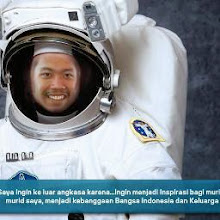Indonesia Space Technology Innovation Research & Development
Add & Edited By:
Arip Nurahman
Department of Physics
Faculty of Sciences and Mathematics, Indonesia University of Education
and
Follower Open Course Ware at Massachusetts Institute of Technology
Cambridge, USA
Department of Physics
http://web.mit.edu/physics/
http://ocw.mit.edu/OcwWeb/Physics/index.htm
&
Aeronautics and Astronautics Engineering
http://web.mit.edu/aeroastro/www/
http://ocw.mit.edu/OcwWeb/Aeronautics-and-Astronautics/index.htm
Department of Physics
Faculty of Sciences and Mathematics, Indonesia University of Education
and
Follower Open Course Ware at Massachusetts Institute of Technology
Cambridge, USA
Department of Physics
http://web.mit.edu/physics/
http://ocw.mit.edu/OcwWeb/Physics/index.htm
&
Aeronautics and Astronautics Engineering
http://web.mit.edu/aeroastro/www/
http://ocw.mit.edu/OcwWeb/Aeronautics-and-Astronautics/index.htm
Space technology is technology that is related to entering space, maintaining and using systems during spaceflight and returning people and things from space.
"Every day" technologies such as weather forecasting, remote sensing, GPS systems, satellite television, and some long distance communications systems critically rely on space infrastructure. Of sciences astronomy and Earth sciences (via remote sensing) most notably benefit from space technology.
Computers and telemetry were once leading edge technologies that might have been considered "space technology" because of their criticality to boosters and spacecraft. They existed prior to the Space Race of the Cold War but their development was vastly accelerated to meet the needs of the two major superpowers' space programs.
While still used today in spacecraft and missiles, the more prosaic applications such as remote monitoring (via telemetry) of patients, water plants, highway conditions, etc. and the widespread use of computers far surpasses their space applications in quantity and variety of application.
While still used today in spacecraft and missiles, the more prosaic applications such as remote monitoring (via telemetry) of patients, water plants, highway conditions, etc. and the widespread use of computers far surpasses their space applications in quantity and variety of application.
Space is such an alien environment that attempting to work in it requires new techniques and knowledge. New technologies originating with or accelerated by space-related endeavors are often subsequently exploited in other economic activities.
This has been widely pointed to as beneficial by space advocates and enthusiasts favoring the investment of public funds in space activities and programs. Political opponents counter that it would be far cheaper to develop specific technologies directly if they are beneficial and scoff at this justification for public expenditures on space-related research.
This has been widely pointed to as beneficial by space advocates and enthusiasts favoring the investment of public funds in space activities and programs. Political opponents counter that it would be far cheaper to develop specific technologies directly if they are beneficial and scoff at this justification for public expenditures on space-related research.
Contents
|
Specific space technologies
- Ablative heat shield
- Aerobot (Planetary probe suspended in atmosphere.)
- Atmospheric braking
- Booster See also ICBM
- Centrifuge
- Gantry
- Human staffed missions
- Interplanetary Internet
- Isolation chamber
- Lander
- Launch pad
- Reentry
- Real time
- Rocket
- Rocket sled
- Rover
- Satellite
- Spacecraft
- Spacecraft propulsion
- Space probe
- Aerobot (Planetary probe suspended in atmosphere.)
- Space shuttle
- Space station
- Space suit
- Space capsule
- Splashdown
- Telemetry
- Thruster
- Asteroid mining
- Single stage to orbit
- Solar power satellite
- Non-rocket spacelaunch
- Space manufacturing
- Suitport
- Acid leaching
- Asteroid mining
- Self-replication
- Space-based industry
- Space colonization
- Space elevator
- Spacelab
- In-Situ Resource Utilization
- PERMANENT — near-term space resource utilization
- Space Studies Institute
- Manufacturing in space
- SKYLAB: A Guidebook (see Chapter 5, section 4)
- Space-age welding
- Spacehab
- Wake Shield Facility program
- Lunar Boom Town A role playing study group at Wikiversity where participants plan and study future space ventures.


























